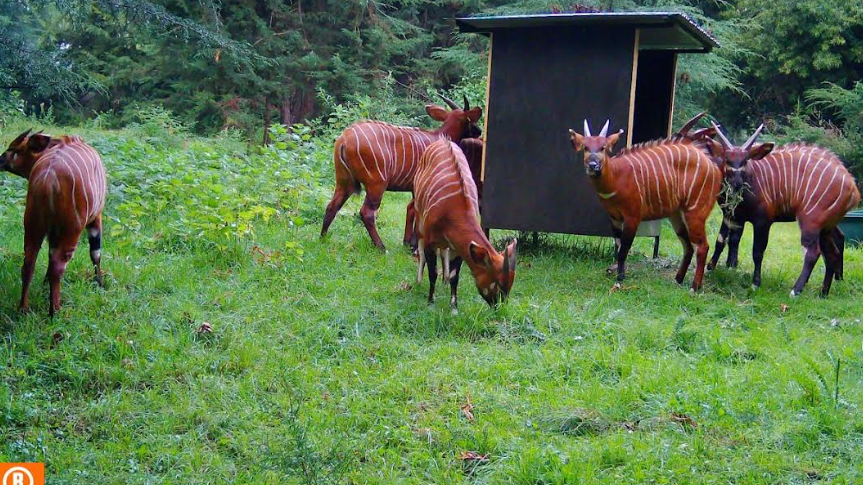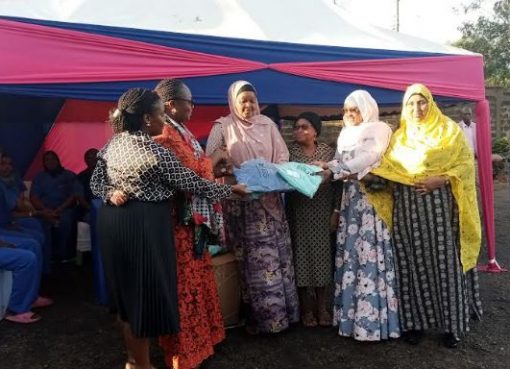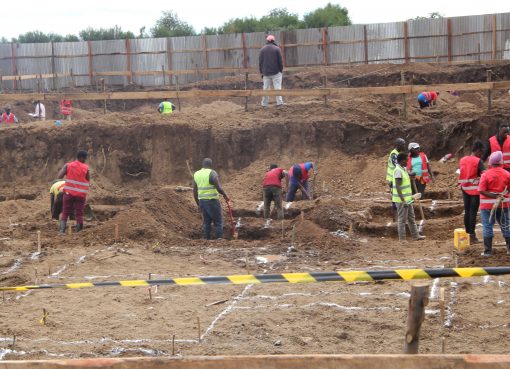On Sunday February 23rd, 17 mountain bongos were safely repatriated from Palm Beach County, Florida, to a specially designed sanctuary on the northeastern slopes of Mt. Kenya. A month later, all the bongos seem to have adapted to the new environment and are expected to start breeding and increase in number.
This momentous event marked a significant milestone in Kenya’s ongoing efforts to recover one of its most iconic and critically endangered species.
The repatriated bongos were donated to the government of Kenya by the Rare Species Conservatory Foundation (RSCF) in Florida, USA, following decades of dedicated research and breeding since 1991.
The complex logistics of this translocation were made possible through close cooperation between RSCF, Lewa Wildlife Conservancy, Tusk, DHL, and the Kenya Wildlife Service (KWS).
In consultation with the project team, RSCF carefully selected 17 bongos comprising 12 females and five males from its large breeding herds.
To prepare them for the travel, they were segregated for pre-shipment testing and preparation, as per KWS protocols, in a specially designed corral-chute system.
They were vaccinated for pathogens and given a pioneering, recombinant-DNA vaccine to help protect against tick-borne disease.
The vaccine was developed specifically for the bongo project by the Infectious Diseases Laboratory (IDL) at the University of Georgia, USA in collaboration with Kenya’s International Livestock Research Institute (ILRI).
On February 22nd, all the 17 animals were successfully crated and given a long-acting sedative to ease their 30-hour journey.
They left Palm Beach International Airport on February 23rd in a Mountain Bongo-branded DHL Boeing 767 that carried the antelopes 7146 nautical miles to Jomo Kenyatta International Airport in Kenya. The bongos were transported in custom-built crates, alongside six tons of pelleted feed.
Three US animal-care experts, including a wildlife veterinarian, accompanied the animals during their journey. Upon arrival, the Kenya Wildlife Service transported the animals 250 kilometers by road to the new sanctuary.
Lewa Wildlife Conservancy played a pivotal role in the construction of the 20-acre mountain bongo sanctuary, in partnership with the Meru Bongo and Rhino Conservation Trust (MBRCT) and Kenya Forest Service.
This sanctuary is part of Kenya’s first-ever conservation public-private, community partnership and stands as a cornerstone of Kenya’s National Bongo Action and Recovery Plan.
It provides a secure home and breeding ground for the species, with the aim of re-establishing sustainable populations across the Mount Kenya ecosystem and beyond.
Lewa Wildlife Conservancy Chief Executive Officer Mike Watson said that bringing the mountain bongos back to Kenya is a great moment in the restoration of the country’s natural heritage.
For decades, he added, these animals have been largely absent from the very forests where they belong, and this project will be crucial in reversing that loss. “Seeing them set foot on Kenyan soil again is a powerful reminder of what can be achieved when organizations work together,” said Mr Watson.
In addition, Lewa Board Member, Prof. Amb. Judi Wakhungu reflected on the historical and conservation significance of this achievement saying that the return of the Bongos and the establishment of the Mountain Bongo Sanctuary is a testament to Kenya’s distinguished wildlife conservation tradition.
“As we celebrate the return of the Bongos, we acknowledge the international partnerships that have preserved this endangered species. Their foremothers and fathers left Kenya in the 1970s. It is remarkable that the 20th generation offspring have returned to their original home and natural habitat where they belong. This is historic and attests to the conservationists’ expertise and dedication,” said Professor Wakhungu.
Meru Bongo & Rhino Conservation Trust, (MBRCT) chairman, John Kinoti expressed gratitude to all the partners who ensured the success of the project.
“We are all happy working towards reversing the extinction of this endangered species. This area has a very favorable climate for the breeding of the Bongos. Their return to their native landscape is not only a victory for conservation but also for local communities.”
“The project has created employment opportunities and promises continued investment in community initiatives around education, healthcare, and livelihoods,” added Mr Kinoti.
Lewa Wildlife Conservancy remains steadfast in its mission to protect and restore endangered species, not only within the conservancy’s boundaries but across Kenya’s protected areas and vital ecosystems.
By Dickson Mwiti





